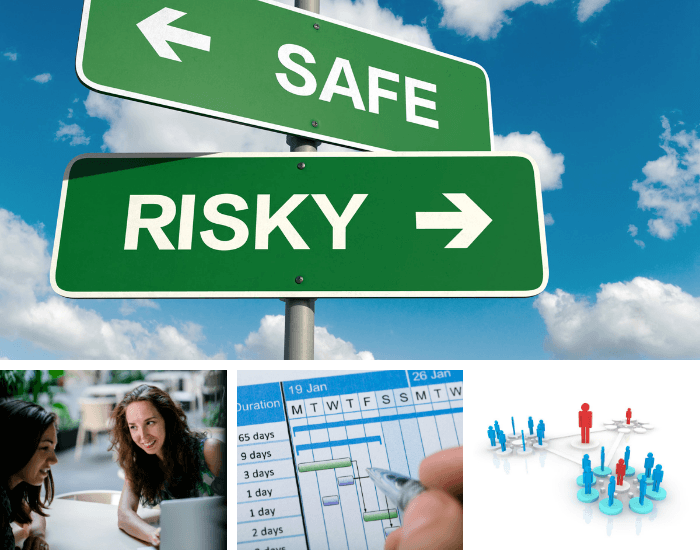This is a guest article by Elizabeth Harrin from GirlsGuideToPM.com.
Much of the time, risk management at the beginning of a project looks like getting the team in a room to review the whole project and work out what might be coming that could affect how the project proceeds.
The project manager writes up the discussion in the risk register along with what the team is going to do to avoid or amplify (in the case of positive risk) the risks. As the project progresses, more risks are identified, dutifully added and managed.

Risks Caused by Team Members
What’s happening here is that we’re looking at the work and impacts on the work. This approach to risk management is very task driven. We ask questions like:
- What might prevent us from hitting that milestone on time?
- What might mean we need to ask for a budget increase during this phase?
- What quality problems might we come across that would give the client an issue?
- Who might be a difficult stakeholder on the project?
These are all valid questions. But they miss one crucial area that massively affects everything on the project every day. Us. The project team.
Our skills, ability to work together as a team, or lack thereof, present the biggest chance of success for the project and also the biggest risk.
Here are some examples of how the people on your team make your project inherently more risky.
More...
"Our skills, ability to work together as a team, or lack thereof, present the biggest chance of success for the project and also the biggest risk." —Elizabeth Harrin
1. Communicating
Many of the projects I have worked on have suffered from some kind of communication issue. Either someone miscommunicated something, or the message didn’t get through at all. Delayed communication causes rework and adds time to your project schedule.
As a project manager, your ability to communicate is crucial. If you aren’t that good at it, you present a risk to the success of the project. It’s that simple!
Equally, the people on your team need to be able to communicate effectively between themselves. They need to be able to ask and answer questions and respond to others in a timely way.
There’s also a communication risk to morale. Lack of communication always makes people feel uncertain. They don’t know about the project’s future or whether they are doing a good job. Your team might feel like they aren’t being listened to. A few poor communications ‘moments’ and you’ll find morale and support for your project will fall drastically.
Risk management actions:
- Create a team culture that expects and is good at communication.
- Be honest when you don’t understand something and expect that honesty from others.
- Share information unless there is a confidential aspect to it that means it can’t be shared.
2. Scheduling
Your schedule is such a key part of whether you can deliver a project on time. And the team is highly involved in putting that schedule together.
When you mix in a few people who haven’t estimated before, or are using new estimating techniques, or a project that has high levels of uncertainty, you are building in planning risks.
Let’s not get started on the impact of bias and how attention to detail slips when your project sponsor is urging you daily to get started already.

Risky Estimates
Risk management actions: Your schedule is such a key part of whether you can deliver a project on time. And the team is highly involved in putting that schedule together.
When you mix in a few people who haven’t estimated before, or are using new estimating techniques, or a project that has high levels of uncertainty, you are building in planning risks. Let’s not get started on the impact of bias and how attention to detail slips when your project sponsor is urging you daily to get started already.
Risk management actions:
- Plan enough time to estimate properly.
- Put processes in place to check or peer review estimates.
- Estimate in ranges and take those ranges through to your project schedule so you have flexibility.
- Use past estimates to inform current scheduling decisions.
- Add contingency to schedule tasks to account for uncertainty in estimates.
3. Resourcing
The way the team works together and takes on tasks is also open to introducing risks to our environment on a project.

Project Manager
Your job as the project manager includes dealing with conflict and keeping the team moving together in the right direction. This isn’t an easy job, and – let’s be honest – it’s often simpler to let small issues go rather than face them head on, especially when the day to day work is so demanding.
However, resourcing on the team can be risky for a number of reasons. You might, for example, delegate work to people who aren’t best placed to do it. That could add extra cost and time – perhaps because they are slower than a skilled resource, or have an impact on quality.
You could add people to the team who don’t fit with the team culture and who bring conflict. Or, at a more fundamental level, who don’t have the skills to do the work.
Conflict itself is a risk on any project, and not being able to deal with it effectively can have major implications for the harmony and productivity of the team.
None of these situations will be news to you as a project leader. But I imagine they are not explicit on your risk log. Should they be? You decide.
Risk management actions:
- Try to take each day as an opportunity to practice your leadership skills.
- Take the temperature of the team regularly to check for morale and motivation issues.
- Make sure the right people are allocated to the right tasks and that everyone has the skills and support they need. Don’t make assumptions.
- Deal with conflict as soon as you can.
You can’t do your project without your team. While there are people-related risks that we bring to our own projects, we can find strategies to deal with those and move forward to complete the project successfully.
About the Author

Elizabeth Harrin
